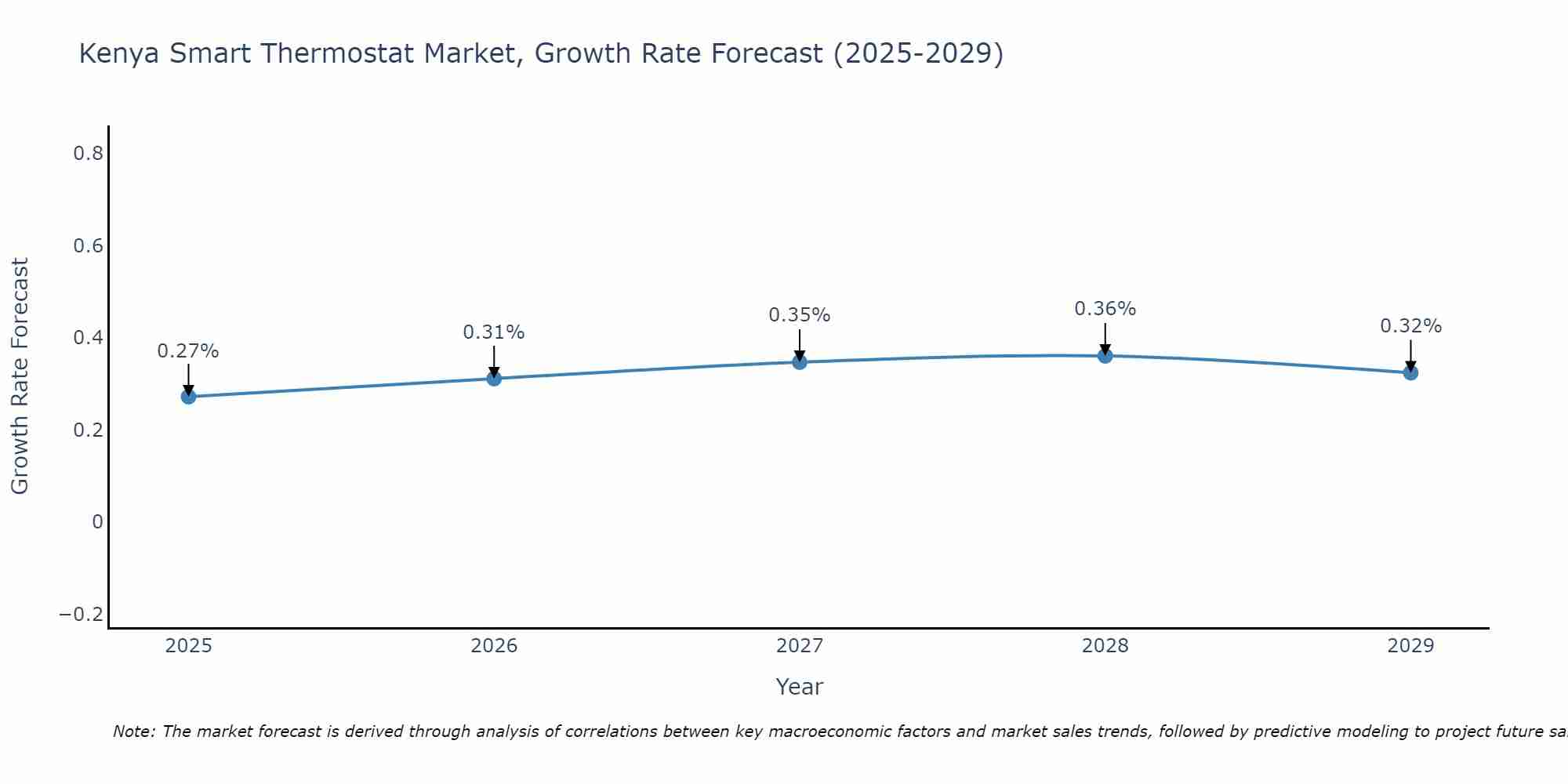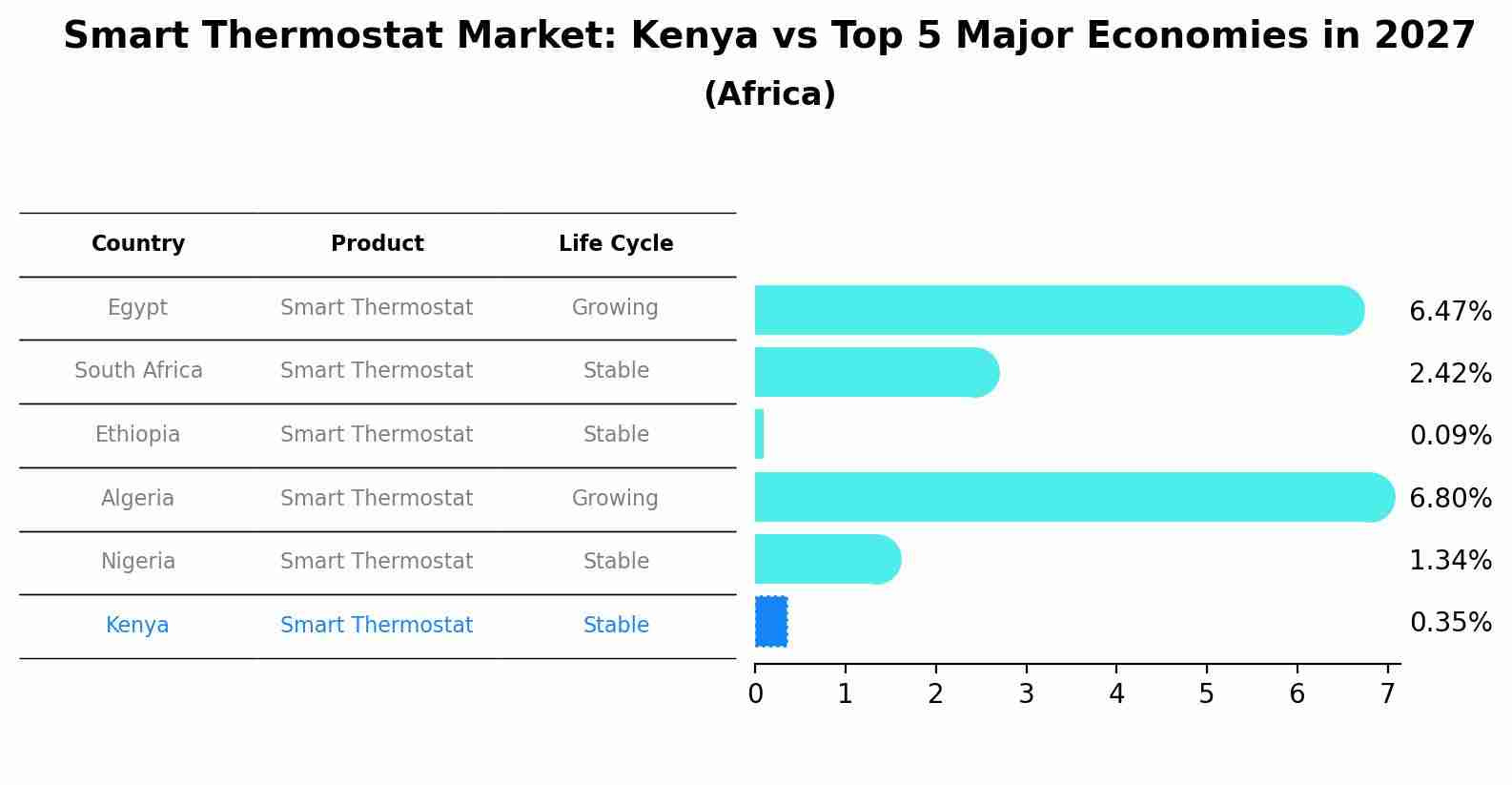Kenya Smart Thermostat Market Outlook | COVID-19 IMPACT, Companies, Forecast, Trends, Revenue, Size, Analysis, Growth, Value, Share & Industry
| Product Code: ETC369530 | Publication Date: Aug 2022 | Updated Date: Jul 2025 | Product Type: Market Research Report | |
| Publisher: 6Wresearch | Author: Ravi Bhandari | No. of Pages: 75 | No. of Figures: 35 | No. of Tables: 20 |
Kenya Smart Thermostat Market Size Growth Rate
The Kenya Smart Thermostat Market is projected to witness mixed growth rate patterns during 2025 to 2029. Growth accelerates to 0.36% in 2028, following an initial rate of 0.27%, before easing to 0.32% at the end of the period.

Smart Thermostat Market: Kenya vs Top 5 Major Economies in 2027 (Africa)
Kenya's Smart Thermostat market is anticipated to experience a stable growth rate of 0.35% by 2027, reflecting trends observed in the largest economy Egypt, followed by South Africa, Ethiopia, Algeria and Nigeria.

Kenya Smart Thermostat Market Synopsis
The Kenya Smart Thermostat Market is experiencing significant growth driven by the increasing adoption of smart home devices and the growing awareness of energy-efficient solutions. Smart thermostats offer users the ability to control and optimize their home`s heating and cooling systems remotely, leading to energy savings and enhanced convenience. The market is witnessing a surge in demand due to factors such as rising disposable income, urbanization, and government initiatives promoting energy efficiency. Key players in the Kenya Smart Thermostat Market include Nest Labs, Ecobee, Honeywell International, among others. The market is expected to continue expanding as consumers seek innovative technologies to improve home comfort and reduce energy consumption.
Kenya Smart Thermostat Market Trends
In the Kenya Smart Thermostat Market, a significant trend is the increasing adoption of smart home technologies driven by the growing awareness of energy efficiency and the convenience of remote control features. Consumers are increasingly looking for ways to reduce energy consumption and optimize their home climate control systems, leading to a rising demand for smart thermostats. The integration of smart thermostats with voice assistants and mobile applications also enhances the user experience, further driving market growth. Additionally, government initiatives promoting energy efficiency in buildings are encouraging the uptake of smart thermostats among residential and commercial users. As the market continues to evolve, we can expect to see more innovations in smart thermostat technology and increased competition among manufacturers to capture a larger share of this expanding market.
Kenya Smart Thermostat Market Challenges
The Kenya Smart Thermostat Market faces several challenges, including limited consumer awareness and adoption due to a lack of understanding of the benefits and functionality of smart thermostats. Additionally, the high initial cost of smart thermostats poses a barrier to entry for many consumers in a price-sensitive market like Kenya. Inadequate infrastructure and support services for smart home technology further hinder the growth of the market. Moreover, concerns around data privacy and security also act as deterrents for potential users. To overcome these challenges, market players need to focus on educating consumers, offering affordable pricing options, improving infrastructure, and addressing security and privacy issues to drive the adoption of smart thermostats in Kenya.
Kenya Smart Thermostat Market Investment Opportunities
The Kenya Smart Thermostat Market presents promising investment opportunities due to the country`s increasing focus on energy efficiency and sustainability. As the government and consumers alike prioritize reducing energy consumption and lowering utility costs, the demand for smart thermostats is expected to rise. Investors can capitalize on this trend by entering the market with innovative and technologically advanced smart thermostat solutions tailored to the Kenyan market`s specific needs and preferences. Additionally, partnerships with local utility companies and smart home integration services can further enhance market penetration and offer a competitive edge. By leveraging the growing awareness and adoption of smart technologies in Kenya, investors in the Smart Thermostat Market can benefit from the country`s evolving energy landscape and contribute to its sustainable development goals.
Jordan Agar Market Government Policies
Government policies related to the Kenya Smart Thermostat Market focus on promoting energy efficiency and sustainability. The government has introduced initiatives such as the Energy Act, which aims to regulate energy consumption and promote renewable energy sources. Additionally, the Kenya Energy Regulatory Commission (ERC) has implemented guidelines for energy efficiency in buildings, encouraging the use of smart technologies like smart thermostats to reduce energy consumption. The government also offers incentives such as tax breaks and subsidies for businesses and consumers investing in energy-efficient solutions like smart thermostats. Overall, the government`s policies in Kenya aim to drive the adoption of smart thermostats and other energy-efficient technologies to reduce carbon emissions and promote a greener economy.
Kenya Smart Thermostat Market Future Outlook
The Kenya Smart Thermostat Market is expected to witness significant growth in the coming years due to the increasing adoption of smart home technologies and the rising awareness of energy efficiency. Factors such as the government`s focus on sustainable development, the growing middle-class population, and the expanding real estate sector will drive the demand for smart thermostats in the country. Additionally, the rising need for cost-effective and convenient heating, ventilation, and air conditioning (HVAC) solutions will further propel market growth. With advancements in IoT technology and the increasing trend towards home automation, the Kenya Smart Thermostat Market is poised for a promising future, offering opportunities for both local and international manufacturers to introduce innovative and energy-efficient products to cater to the evolving needs of consumers.
Key Highlights of the Report:
- Kenya Smart Thermostat Market Outlook
- Market Size of Kenya Smart Thermostat Market, 2021
- Forecast of Kenya Smart Thermostat Market, 2031
- Historical Data and Forecast of Kenya Smart Thermostat Revenues & Volume for the Period 2018 - 2031
- Kenya Smart Thermostat Market Trend Evolution
- Kenya Smart Thermostat Market Drivers and Challenges
- Kenya Smart Thermostat Price Trends
- Kenya Smart Thermostat Porter's Five Forces
- Kenya Smart Thermostat Industry Life Cycle
- Historical Data and Forecast of Kenya Smart Thermostat Market Revenues & Volume By Type for the Period 2018 - 2031
- Historical Data and Forecast of Kenya Smart Thermostat Market Revenues & Volume By Wireless for the Period 2018 - 2031
- Historical Data and Forecast of Kenya Smart Thermostat Market Revenues & Volume By Wireless for the Period 2018 - 2031
- Historical Data and Forecast of Kenya Smart Thermostat Market Revenues & Volume By End-User Vertical for the Period 2018 - 2031
- Historical Data and Forecast of Kenya Smart Thermostat Market Revenues & Volume By Residential for the Period 2018 - 2031
- Historical Data and Forecast of Kenya Smart Thermostat Market Revenues & Volume By Commercial for the Period 2018 - 2031
- Kenya Smart Thermostat Import Export Trade Statistics
- Market Opportunity Assessment By Type
- Market Opportunity Assessment By End-User Vertical
- Kenya Smart Thermostat Top Companies Market Share
- Kenya Smart Thermostat Competitive Benchmarking By Technical and Operational Parameters
- Kenya Smart Thermostat Company Profiles
- Kenya Smart Thermostat Key Strategic Recommendations
Frequently Asked Questions About the Market Study (FAQs):
- Single User License$ 1,995
- Department License$ 2,400
- Site License$ 3,120
- Global License$ 3,795
Search
Thought Leadership and Analyst Meet
Our Clients
Related Reports
- Canada Oil and Gas Market (2026-2032) | Share, Segmentation, Value, Industry, Trends, Forecast, Analysis, Size & Revenue, Growth, Competitive Landscape, Outlook, Companies
- Germany Breakfast Food Market (2026-2032) | Industry, Share, Growth, Size, Companies, Value, Analysis, Revenue, Trends, Forecast & Outlook
- Australia Briquette Market (2025-2031) | Growth, Size, Revenue, Forecast, Analysis, Trends, Value, Share, Industry & Companies
- Vietnam System Integrator Market (2025-2031) | Size, Companies, Analysis, Industry, Value, Forecast, Growth, Trends, Revenue & Share
- ASEAN and Thailand Brain Health Supplements Market (2025-2031) | Strategy, Consumer Insights, Analysis, Investment Trends, Opportunities, Growth, Size, Share, Industry, Revenue, Segments, Value, Segmentation, Supply, Forecast, Restraints, Outlook, Competition, Drivers, Trends, Demand, Pricing Analysis, Competitive, Strategic Insights, Companies, Challenges
- ASEAN Bearings Market (2025-2031) | Strategy, Consumer Insights, Analysis, Investment Trends, Opportunities, Growth, Size, Share, Industry, Revenue, Segments, Value, Segmentation, Supply, Forecast, Restraints, Outlook, Competition, Drivers, Trends, Demand, Pricing Analysis, Competitive, Strategic Insights, Companies, Challenges
- Europe Flooring Market (2025-2031) | Outlook, Share, Industry, Trends, Forecast, Companies, Revenue, Size, Analysis, Growth & Value
- Saudi Arabia Manlift Market (2025-2031) | Outlook, Size, Growth, Trends, Companies, Industry, Revenue, Value, Share, Forecast & Analysis
- Uganda Excavator, Crane, and Wheel Loaders Market (2025-2031) | Strategy, Consumer Insights, Analysis, Investment Trends, Opportunities, Growth, Size, Share, Industry, Revenue, Segments, Value, Segmentation, Supply, Forecast, Restraints, Outlook, Competition, Drivers, Trends, Demand, Pricing Analysis, Competitive, Strategic Insights, Companies, Challenges
- Rwanda Excavator, Crane, and Wheel Loaders Market (2025-2031) | Strategy, Consumer Insights, Analysis, Investment Trends, Opportunities, Growth, Size, Share, Industry, Revenue, Segments, Value, Segmentation, Supply, Forecast, Restraints, Outlook, Competition, Drivers, Trends, Demand, Pricing Analysis, Competitive, Strategic Insights, Companies, Challenges
Industry Events and Analyst Meet
Whitepaper
- Middle East & Africa Commercial Security Market Click here to view more.
- Middle East & Africa Fire Safety Systems & Equipment Market Click here to view more.
- GCC Drone Market Click here to view more.
- Middle East Lighting Fixture Market Click here to view more.
- GCC Physical & Perimeter Security Market Click here to view more.
6WResearch In News
- Doha a strategic location for EV manufacturing hub: IPA Qatar
- Demand for luxury TVs surging in the GCC, says Samsung
- Empowering Growth: The Thriving Journey of Bangladesh’s Cable Industry
- Demand for luxury TVs surging in the GCC, says Samsung
- Video call with a traditional healer? Once unthinkable, it’s now common in South Africa
- Intelligent Buildings To Smooth GCC’s Path To Net Zero


















